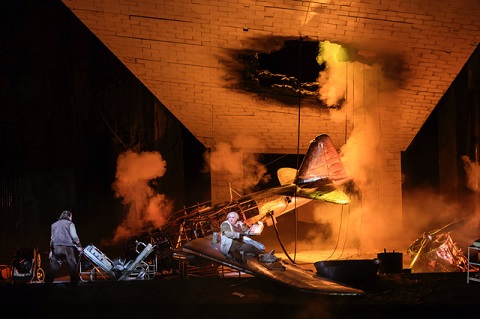Keith Warner’s production, however, remains somewhat troubling; one can
spend more time trying to unravel the allusions, the meanings behind the
clutter, the complex perceptions of comedy and tragedy than would be wise
for any sane man.
Der Ring Des Nibelungen
is all about interconnectivity and Warner’s direction attempts to establish
this, even in esoteric ways. The toy aeroplane from Das Rheingold,
for example, is transformed in Siegfried as the curtain rises into
the wrecked fuselage of a stripped down, much larger aeroplane. As with
much of the imagery here it’s symbolic - just as a sword rises from a
wrecked pram during the Vorspiel, so Wotan, disguised as the Wanderer, does
so from the broken shell of the cockpit. But why there should be
an aeroplane here at all is quite another question. As with much of Wagner,
time is constantly in a state of flux; motifs come and go, and Warner does
the same with his imagery. Act III of this Siegfried floats moving
clouds against a wall but it’s the perspective that is different and looks
back towards Act I. Rather than looking two-dimensional, the angle gives
the impression of floating through clouds, rather as you’d experience from
a plane as we recall the wreckage from earlier. For a fleeting moment,
you’re reminded of Leni Riefenstahl’s Triumph of the Will. The
sprawling algebraic equations before Act I begins make little sense - both
as to their meaning and why they should be there - but when we get to Act
II, as Siegfried confronts Fafner, the Tarnhelm itself is nothing but an
algorithmic Rubik’s Cube.
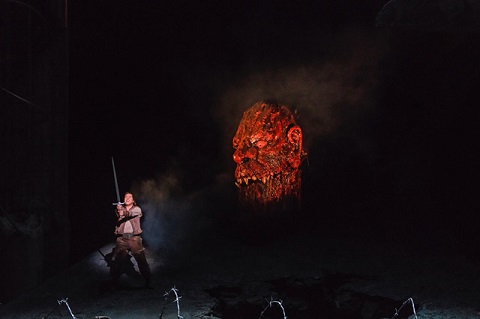 Stefan Vinke as Siegfried. Photo Credit: Bill Cooper.
Stefan Vinke as Siegfried. Photo Credit: Bill Cooper.
Paradoxes abound in Siegfried. It’s a comedy within a tragedy;
it’s about the transition of the world of Wotan and the Gods into the
redemptive vision of love he has for Siegfried and Brünnhilde, the old
order giving way to a new order. If the downfall of the Gods is seen as
inevitable, the calamity that will become the tragedy of the final opera
isn’t foreseen. Warner’s take on this in Siegfried isn’t really
clear - other than the biggest paradox of all in that Wotan is placing his
faith for a new future in a Siegfried who is clearly unsuitable.
The comedy in this Siegfried is surprisingly restrained. Warner
takes a notably neutral standpoint characterising his Mime, for example.
Gerhard Siegel, returning to this production, is magnificent, both vocally
and dramatically. Balance becomes an art form in his purely theatrical
characterisation of the role - in no sense could one suggest this is a
caricature of the part, as can so easily happen. Warner makes a distinction
between comedy and making his Mime a clown - Siegel is every part a
malevolent dwarf, part mad scientist, as untidy and living amid his clutter
as he is scheming and hollow of emotion. He howls, groans, screams and
whines. He’s intemperate and evasive. Siegel’s long scenes with Stefan
Vinke’s Siegfried are wonderfully complementary: There is a real sense of
spontaneity between these two singers, and the humour unfolds without
feeling forced.
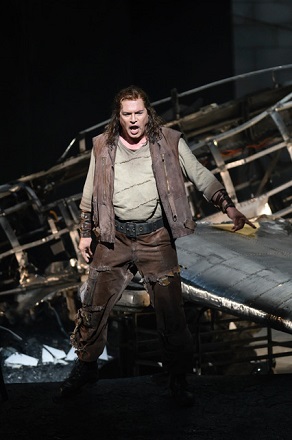 Stefan Vinke as Siegfried. Photo Credit: Bill Cooper.
Stefan Vinke as Siegfried. Photo Credit: Bill Cooper.
Stefan Vinke’s Siegfried is so extraordinarily convincing - this is after
all the 100th time he has sung the role - you often feel he is
the Siegfried of our time. With his patched-up army fatigues and leather
battle vest, there is a punkish, roguish side to him that Warner is more
than willing to explore. There is a boundless energy to this Siegfried - he
hops over discarded mattresses, jumps back and forth over barbed wire
fences and brandishes his newly forged sword like a warrior. He’s as crusty
as he is anarchic; but there is a seething unpretentiousness and innocence
as well. One minute he is cracking an egg over Mime’s forehead; the next he
is forging his sword. He transforms from a boy into an all-knowing
grease-monkey who can work the aeroplane’s propellers to set the forge
working and attach pumps to fuel the flames. Does Warner make this all seem
incredulous? Well, yes, he does. This Siegfried seems entirely
schizophrenic. On the other hand, this is a Siegfried who is all but immune
to any manifestation of physical danger or fear. Siegfried’s battle with
Fafner, and his transformation into a dragon, might be considered partly
comic - but Warner makes Vinke’s Siegfried take his cue from Wagner’s
music, with all the darkness it portrays, rather than the literal humour
the libretto suggests.
But Vinke’s Siegfried is another paradox in this production too. The
heroism of Act II at the foot of Fafner’s cave is a correction to the
beguiling innocence of his woodland scene with Heather Engebretson’s
acrobatic Woodbird. But innocence can easily become petulance; he becomes
frustrated by his inability to make a sound from the reed he has made. In
Act III, Warner completely subverts the balance of love versus power that
Wotan has imagined for Siegfried and Brünnhilde. This isn’t exactly a
vision of Siegfried who will emerge from the Volsungs to triumph over the
power of the Gods. Siegfried the punk is too radical to embrace the concept
of love - his reticence as he awakens Brünnhilde is borne of childlike
shyness. Even the lighting of this scene cleverly suggests it’s full of
apprehension and unknowingness. Warner literally tosses the concept of love
into the flames. But even when Nina Stemme’s magnificent and imposing
Brünnhilde emerges we don’t get the inklings of a consummation but a game
of cat-and-mouse. Warner keeps them apart, on opposing sides of a grey
wall. They are literally and figuratively a world apart, Brünnhilde’s
ecstatic dialogue - so searingly sung by Stemme - almost falling on
Siegfried’s deaf ears. As Siegfried throws himself onto Brünnhilde at the
opera’s very end it’s as charmless as the filthy mattress itself.
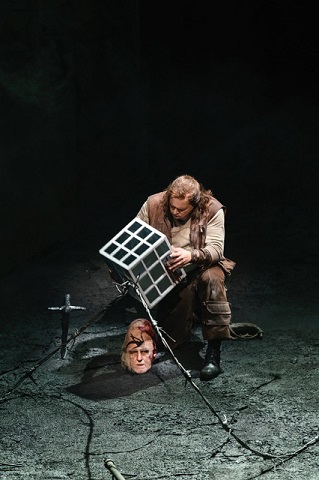 Brindley Sherratt as Fafner and Stefan Vinke as Siegfried. Photo Credit: Bill Cooper.
Brindley Sherratt as Fafner and Stefan Vinke as Siegfried. Photo Credit: Bill Cooper.
Even withstanding the complexity of ideas in this production, and the
somewhat wilful direction, there is much that stands out as exceptional.
You can never escape the underlying tension and anger that characterises
much of this Siegfried: I lost count of the number of times a
chair was thrown somewhere around the stage. Antonio Pappano’s gripping
conducting of the score is so extraordinarily visual, so seismic and
visceral at times, that it mirrors the staging to perfection. His pacing of
the score may be fast for some listeners but it seemed near-perfect to me.
Only briefly, notably in Act II, did the outstanding Royal Opera House
Orchestra wobble or have issues with intonation. Vinke’s hammering in the
Act I forging scene is breathtakingly musical and is replicated in the
timbre of the orchestra, too; it is not always like this in staged
performances of Siegfried. I don’t think I’ve ever seen a more
dramatic Vorspiel than the one we got to the opening of Act III. Pappano’s
very brisk, fiery tempo was electrifying, but combine this with Wotan
angrily tossing a mattress and whatever else he could get his hands on from
a rotating platform and the effect was unforgettable. If the earth goddess
Erde being wheeled in on a high throne seemed perhaps a touch clumsy, the
orchestra was as dark as Wiebke Lehmkuhl’s gorgeously plush voice. John
Lundgren’s Wanderer had every reason to struggle while singing on a
revolving platform but he didn’t. The voice remained as rich, dark and
focused as it had from his first appearance in Act I. His Riddle Scene with
Mime was full of mystery. Johannes Martin Kränzle’s Alberich resonated
evil, and Brindley Sherratt’s Fafner had a dark tone that cracked like
thunder.
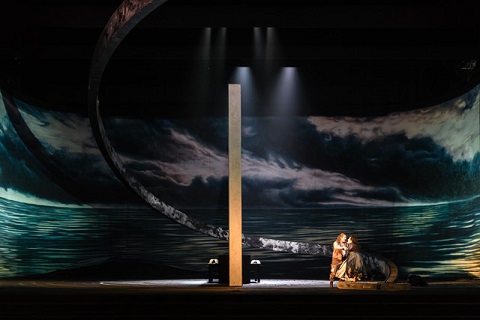 Nina Stemme as Brünnhilde and Stefan Vinke as Siegfried. Photo Credit: Bill Cooper.
Nina Stemme as Brünnhilde and Stefan Vinke as Siegfried. Photo Credit: Bill Cooper.
Nina Stemme’s Brünnhilde has grown into one of the great dramatic
performances. It isn’t just that the voice has such tremendous range, it’s
now that she believes entirely she can equal the complexity of the role.
The evenness of tone, the ability to be both lyrical and dramatic is very
impressive. She fortunately lacks the hardness of inflection that sometimes
marred a Nilsson performance - Stemme’s Brünnhilde is quite notable for
being exceptionally warm in tone, but she is equally merciless in keeping
the line clean.
Stefan Vinke’s Siegfried is simply peerless. Casting Siegfried is always a
problem but Vinke has everything you could ask for in a great Siegfried.
Certainly, when I heard him take on the part early in his career there were
times you felt he lacked the stamina to see it through; that is
unquestionably not the case today. That he had such reserves of power to
give with Stemme such an overwhelming final duet was remarkable. So much of
Siegfried lies in the higher part of the voice that it’s easy for a tenor
to become lazy but Vinke has a laser-sharp power to his upper range which
enables him to sustain a note effortlessly. Nothing felt clipped; you
didn’t feel that there were any shortcuts. There is also beautiful clarity
and tonal richness to this voice as well - it’s honeyed, golden, entirely
even for a Wagner tenor. I think I’d be hard pressed to hear a better
performance of Siegfried from anyone else than the one we got here.
From a vocal, musical and artistic point of view this Siegfried
was one of the great evening’s at Covent Garden in many years.
Marc Bridle
Richard Wagner: Siegfried
Stefan Vinke - Siegfried, Nina Stemme - Brünnhilde, Gerhard Siegel - Mime,
John Lundgren - Wanderer, Johannes Martin Kränzle - Alberich, Brindley
Sherratt - Fafner, Wiebke Lehmkuhl - Erda, Heather Engebretson - Woodbird; Keith Warner - Director, Antonio Pappano - conductor, Stefanos Lazaridis -
Set Designer, Wolfgang Göbbel - Lighting, Orchestra of Royal Opera House.
Royal Opera House, Covent Garden, London; 29th September 2018.
